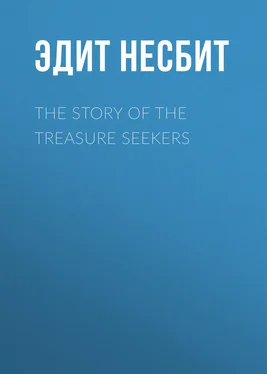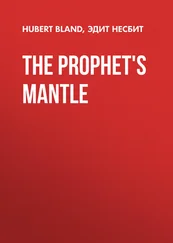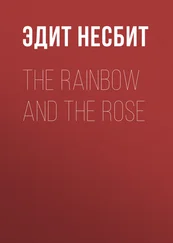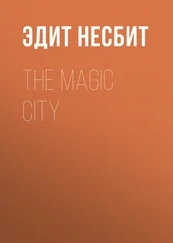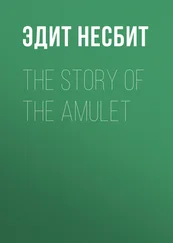Эдит Несбит - The Story of the Treasure Seekers
Здесь есть возможность читать онлайн «Эдит Несбит - The Story of the Treasure Seekers» — ознакомительный отрывок электронной книги совершенно бесплатно, а после прочтения отрывка купить полную версию. В некоторых случаях можно слушать аудио, скачать через торрент в формате fb2 и присутствует краткое содержание. Жанр: Детские приключения, Прочие приключения, foreign_antique, foreign_prose, foreign_children, на английском языке. Описание произведения, (предисловие) а так же отзывы посетителей доступны на портале библиотеки ЛибКат.
- Название:The Story of the Treasure Seekers
- Автор:
- Жанр:
- Год:неизвестен
- ISBN:нет данных
- Рейтинг книги:2 / 5. Голосов: 2
-
Избранное:Добавить в избранное
- Отзывы:
-
Ваша оценка:
- 40
- 1
- 2
- 3
- 4
- 5
The Story of the Treasure Seekers: краткое содержание, описание и аннотация
Предлагаем к чтению аннотацию, описание, краткое содержание или предисловие (зависит от того, что написал сам автор книги «The Story of the Treasure Seekers»). Если вы не нашли необходимую информацию о книге — напишите в комментариях, мы постараемся отыскать её.
The Story of the Treasure Seekers — читать онлайн ознакомительный отрывок
Ниже представлен текст книги, разбитый по страницам. Система сохранения места последней прочитанной страницы, позволяет с удобством читать онлайн бесплатно книгу «The Story of the Treasure Seekers», без необходимости каждый раз заново искать на чём Вы остановились. Поставьте закладку, и сможете в любой момент перейти на страницу, на которой закончили чтение.
Интервал:
Закладка:
She told us a lot of other pieces but I cannot remember them, and she talked to us all the way up, and when we got nearly to Cannon Street she said—
‘I’ve got two new shillings here! Do you think they would help to smooth the path to Fame?’
Noel said, ‘Thank you,’ and was going to take the shilling. But Oswald, who always remembers what he is told, said—
‘Thank you very much, but Father told us we ought never to take anything from strangers.’
‘That’s a nasty one,’ said the lady—she didn’t talk a bit like a real lady, but more like a jolly sort of grown-up boy in a dress and hat—‘a very nasty one! But don’t you think as Noel and I are both poets I might be considered a sort of relation? You’ve heard of brother poets, haven’t you? Don’t you think Noel and I are aunt and nephew poets, or some relationship of that kind?’
I didn’t know what to say, and she went on—
‘It’s awfully straight of you to stick to what your Father tells you, but look here, you take the shillings, and here’s my card. When you get home tell your Father all about it, and if he says No, you can just bring the shillings back to me.’
So we took the shillings, and she shook hands with us and said, ‘Good-bye, and good hunting!’
We did tell Father about it, and he said it was all right, and when he looked at the card he told us we were highly honoured, for the lady wrote better poetry than any other lady alive now. We had never heard of her, and she seemed much too jolly for a poet. Good old Kipling! We owe him those two shillings, as well as the Jungle books!
CHAPTER 5. THE POET AND THE EDITOR
It was not bad sport—being in London entirely on our own hook. We asked the way to Fleet Street, where Father says all the newspaper offices are. They said straight on down Ludgate Hill—but it turned out to be quite another way. At least we didn’t go straight on.
We got to St Paul’s. Noel would go in, and we saw where Gordon was buried—at least the monument. It is very flat, considering what a man he was.
When we came out we walked a long way, and when we asked a policeman he said we’d better go back through Smithfield. So we did. They don’t burn people any more there now, so it was rather dull, besides being a long way, and Noel got very tired. He’s a peaky little chap; it comes of being a poet, I think. We had a bun or two at different shops—out of the shillings—and it was quite late in the afternoon when we got to Fleet Street. The gas was lighted and the electric lights. There is a jolly Bovril sign that comes off and on in different coloured lamps. We went to the Daily Recorder office, and asked to see the Editor. It is a big office, very bright, with brass and mahogany and electric lights.
They told us the Editor wasn’t there, but at another office. So we went down a dirty street, to a very dull-looking place. There was a man there inside, in a glass case, as if he was a museum, and he told us to write down our names and our business. So Oswald wrote—
Then we waited on the stone stairs; it was very draughty. And the man in the glass case looked at us as if we were the museum instead of him. We waited a long time, and then a boy came down and said—
‘The Editor can’t see you. Will you please write your business?’ And he laughed. I wanted to punch his head.
But Noel said, ‘Yes, I’ll write it if you’ll give me a pen and ink, and a sheet of paper and an envelope.’
The boy said he’d better write by post. But Noel is a bit pig-headed; it’s his worst fault. So he said—‘No, I’ll write it now .’ So I backed him up by saying—
‘Look at the price penny stamps are since the coal strike!’
So the boy grinned, and the man in the glass case gave us pen and paper, and Noel wrote. Oswald writes better than he does; but Noel would do it; and it took a very long time, and then it was inky.
DEAR MR EDITOR, I want you to print my poetry and pay for it, and I am a friend of Mrs Leslie’s; she is a poet too.
Your affectionate friend, NOEL BASTABLE.He licked the envelope a good deal, so that that boy shouldn’t read it going upstairs; and he wrote ‘Very private’ outside, and gave the letter to the boy. I thought it wasn’t any good; but in a minute the grinning boy came back, and he was quite respectful, and said—‘The Editor says, please will you step up?’
We stepped up. There were a lot of stairs and passages, and a queer sort of humming, hammering sound and a very funny smell. The boy was now very polite, and said it was the ink we smelt, and the noise was the printing machines.
After going through a lot of cold passages we came to a door; the boy opened it, and let us go in. There was a large room, with a big, soft, blue-and-red carpet, and a roaring fire, though it was only October; and a large table with drawers, and littered with papers, just like the one in Father’s study. A gentleman was sitting at one side of the table; he had a light moustache and light eyes, and he looked very young to be an editor—not nearly so old as Father. He looked very tired and sleepy, as if he had got up very early in the morning; but he was kind, and we liked him. Oswald thought he looked clever. Oswald is considered a judge of faces.
‘Well,’ said he, ‘so you are Mrs Leslie’s friends?’
‘I think so,’ said Noel; ‘at least she gave us each a shilling, and she wished us “good hunting!”’
‘Good hunting, eh? Well, what about this poetry of yours? Which is the poet?’
I can’t think how he could have asked! Oswald is said to be a very manly-looking boy for his age. However, I thought it would look duffing to be offended, so I said—
‘This is my brother Noel. He is the poet.’ Noel had turned quite pale. He is disgustingly like a girl in some ways. The Editor told us to sit down, and he took the poems from Noel, and began to read them. Noel got paler and paler; I really thought he was going to faint, like he did when I held his hand under the cold-water tap, after I had accidentally cut him with my chisel. When the Editor had read the first poem—it was the one about the beetle—he got up and stood with his back to us. It was not manners; but Noel thinks he did it ‘to conceal his emotion,’ as they do in books. He read all the poems, and then he said—
‘I like your poetry very much, young man. I’ll give you—let me see; how much shall I give you for it?’
‘As much as ever you can,’ said Noel. ‘You see I want a good deal of money to restore the fallen fortunes of the house of Bastable.’
The gentleman put on some eye-glasses and looked hard at us. Then he sat down.
‘That’s a good idea,’ said he. ‘Tell me how you came to think of it. And, I say, have you had any tea? They’ve just sent out for mine.’
He rang a tingly bell, and the boy brought in a tray with a teapot and a thick cup and saucer and things, and he had to fetch another tray for us, when he was told to; and we had tea with the Editor of the Daily Recorder. I suppose it was a very proud moment for Noel, though I did not think of that till afterwards. The Editor asked us a lot of questions, and we told him a good deal, though of course I did not tell a stranger all our reasons for thinking that the family fortunes wanted restoring. We stayed about half an hour, and when we were going away he said again—
‘I shall print all your poems, my poet; and now what do you think they’re worth?’
‘I don’t know,’ Noel said. ‘You see I didn’t write them to sell.’
‘Why did you write them then?’ he asked.
Читать дальшеИнтервал:
Закладка:
Похожие книги на «The Story of the Treasure Seekers»
Представляем Вашему вниманию похожие книги на «The Story of the Treasure Seekers» списком для выбора. Мы отобрали схожую по названию и смыслу литературу в надежде предоставить читателям больше вариантов отыскать новые, интересные, ещё непрочитанные произведения.
Обсуждение, отзывы о книге «The Story of the Treasure Seekers» и просто собственные мнения читателей. Оставьте ваши комментарии, напишите, что Вы думаете о произведении, его смысле или главных героях. Укажите что конкретно понравилось, а что нет, и почему Вы так считаете.
